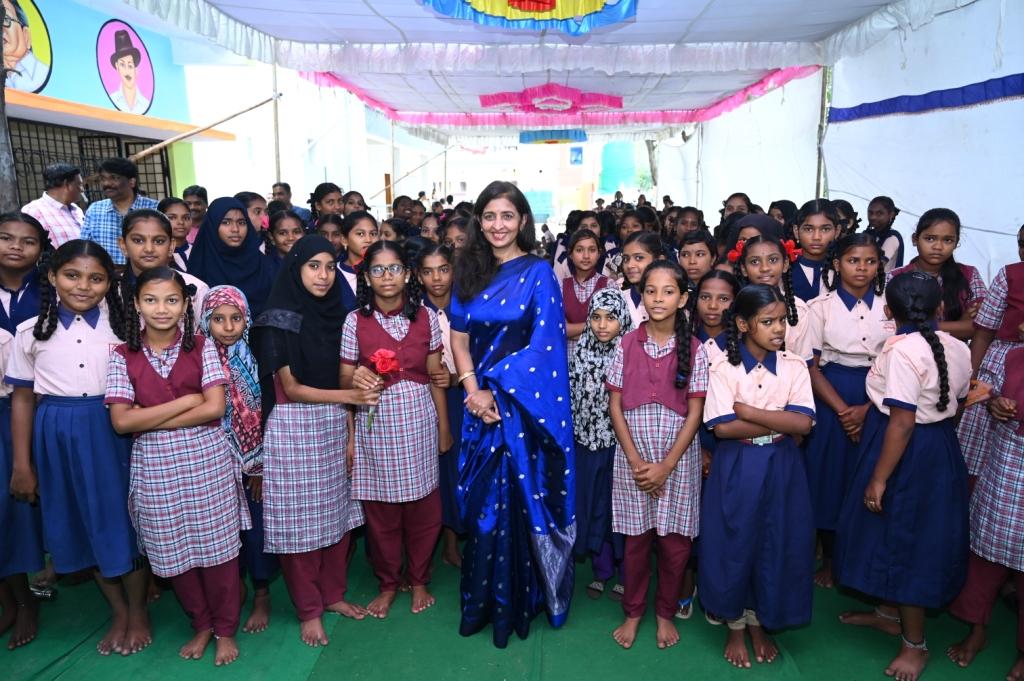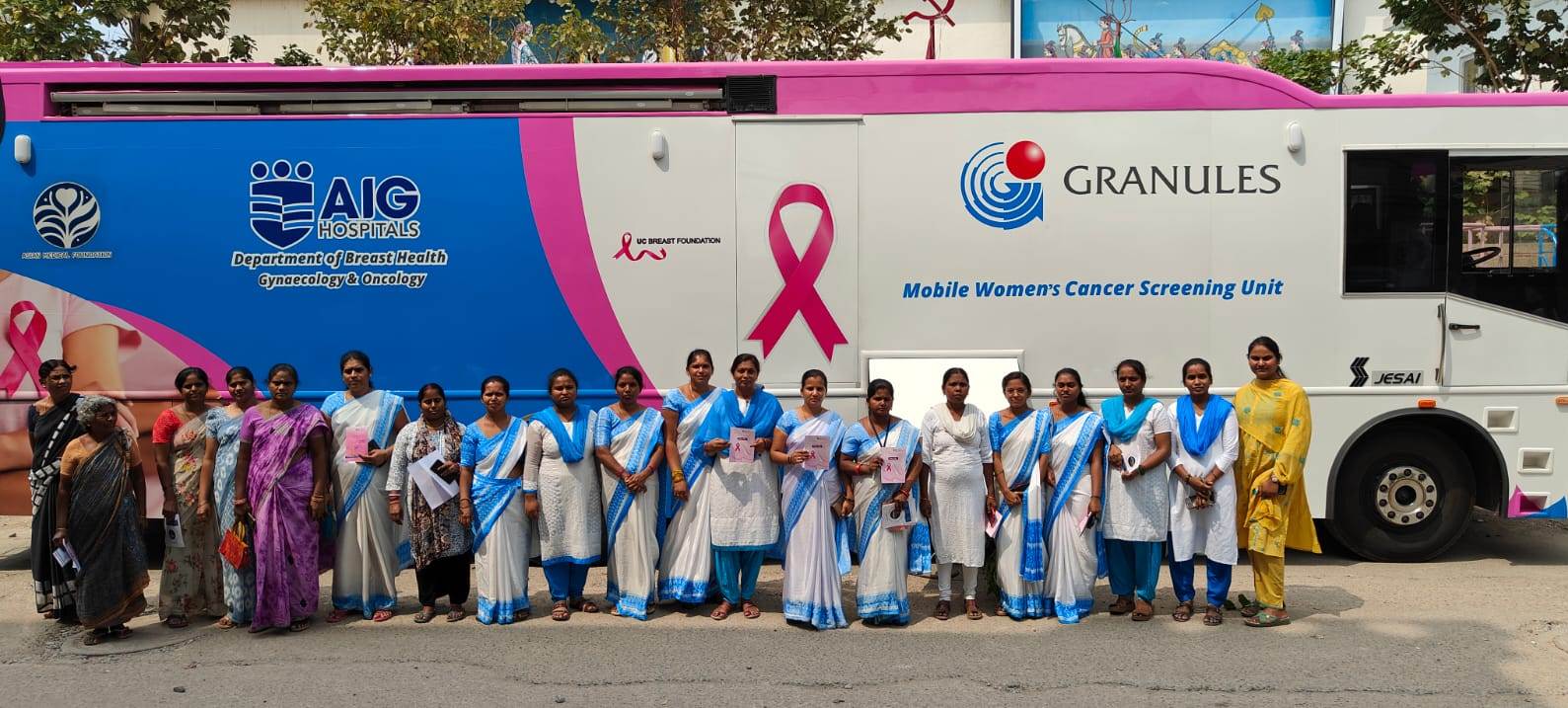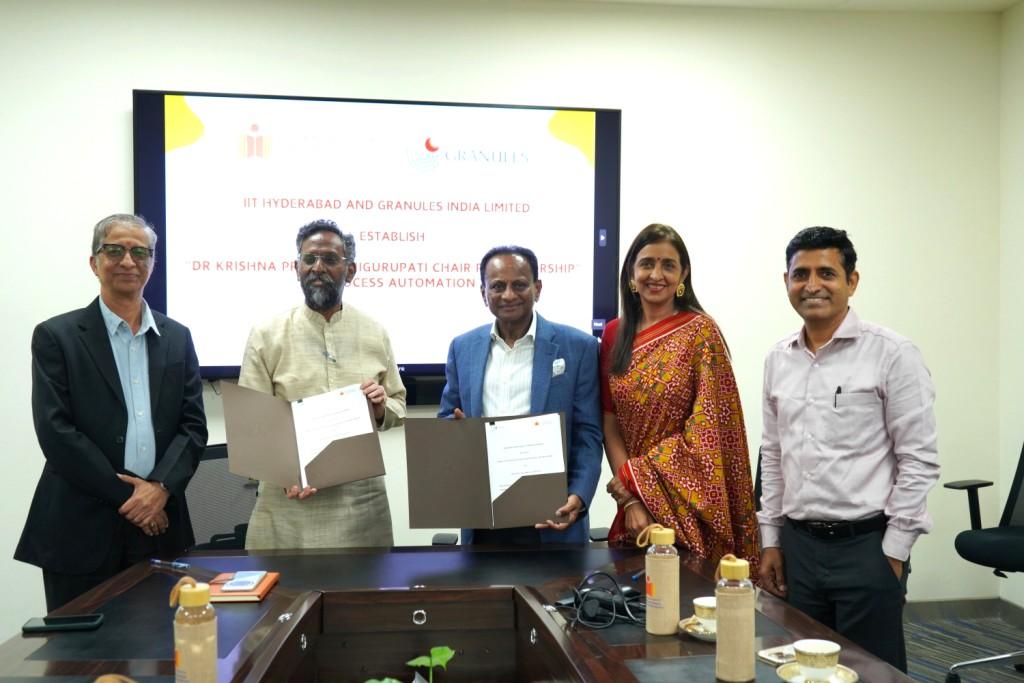Granules India has long been recognized for its global presence in pharmaceuticals, but what sets the company apart today is the way it has aligned its business growth with a deeper sense of responsibility. With a strong focus on healthcare access, education, skilling, and environmental stewardship, the company is steadily building interventions that respond to real community needs while advancing its sustainability commitments.
Leading this work is Ms. Uma Chigurupati, Executive Director, Granules India, who has been closely involved in shaping programs that go beyond short-term relief to create systemic and lasting change. From decarbonisation of the pharmaceutical supply chain to initiatives like Pharma Pathshala and the Breast Health Express, her approach reflects a belief that business and social progress are interdependent.
In this interview, Mrs. Chigurupati shares how Granules India defines impact, builds partnerships, and embeds sustainability into its operations, offering a perspective on what responsible corporate citizenship looks like in practice.
Read the complete interview below.
Q. Granules India is today a globally recognized pharmaceutical company. Could you start by sharing the company’s overarching CSR and sustainability goals and what drives these priorities?
A: At Granules India, our CSR and sustainability philosophy is deeply rooted in our purpose of "Healing lives responsibly through pioneering green science." This isn't just a corporate statement—it's a commitment that drives every aspect of our operations.
Our CSR initiatives focus on four key areas: environment, education, skilling, and healthcare. These priorities align with our broader sustainability framework anchored in environmental stewardship, social responsibility, and governance excellence. Through our Granules CZRO initiative, launched in 2023, we're pioneering the decarbonisation of the pharmaceutical supply chain, working towards Net Zero emissions by 2050.
Our focus on sustainable manufacturing processes demonstrates how we're building an internal culture of sustainability while reimagining pharmaceutical manufacturing.
I'm honoured that our efforts were recently recognised when I received the Exemplary Leadership in Social Impact & Corporate Responsibility Award at the India Philanthropy Summit 2025, hosted by EdelGive Foundation and HURUN INDIA. The Golden Peacock Award for Sustainability 2024 further validates our approach.
What truly drives these priorities is our belief that business success and social responsibility must go hand in hand. Having co-founded this company with my husband Dr. Krishna Prasad Chigurupati in 1984, I've witnessed how sustainable practices create lasting value for all stakeholders—customers, employees, communities, and shareholders alike.
Q. Granules India has set a goal of impacting 1 million lives by 2030. Can you outline the key focus areas and initiatives driving this vision, and how you define “impact” beyond just numbers?
A: In FY 2024-25, we positively impacted 1,00,000 lives through our various CSR initiatives. Our vision goes beyond mere numbers—it's about creating meaningful, sustainable change across healthcare accessibility, education, skill development, and community welfare.
Through Pharma Pathshala alone, we aim to empower and upskill more than 10,000 individuals by 2030, creating a talent pool of skilled pharmaceutical professionals. The multiplier effect is significant when you consider that each trained individual supports a family, contributes to their community, and enables better healthcare delivery.
Our healthcare initiatives, including the Breast Health Express has already created awareness among 6,000+ women and screened 3,000+ through 36 camps, demonstrating our commitment to preventive healthcare. The Dr. Chigurupati Nageswara Rao Rotary Dialysis Centre and Dr. Chigurupati Nageswara Rao Ocular Pharmacology Research Centre further expand our healthcare footprint.
 We define "impact" through multiple dimensions—sustainable employment created, health outcomes improved, a better educational environment, and environmental benefits delivered. It's the underprivileged youth finding career paths, rural women receiving critical health screenings, and communities gaining access to clean water.
We define "impact" through multiple dimensions—sustainable employment created, health outcomes improved, a better educational environment, and environmental benefits delivered. It's the underprivileged youth finding career paths, rural women receiving critical health screenings, and communities gaining access to clean water.
Our approach focuses on creating systemic change rather than temporary relief. We're building capacity within communities to thrive independently, ensuring our initiatives address root causes while creating sustainable, long-term transformation. This comprehensive approach to impact drives us to continuously evolve and expand our programs based on community needs and measurable outcomes.
Q. The company has launched programs ranging from women’s cancer screening units to TB nutritional support and dialysis centers. Could you walk us through these healthcare initiatives and the gaps they are addressing? Are there any patient stories or community transformations from the ground that have stayed with you?
A: Our healthcare initiatives are designed to address critical gaps in accessibility and affordability, particularly for underserved communities. The Breast Health Express, launched in September 2024 in collaboration with AIG Hospitals, is particularly close to my heart. This mobile unit, equipped with advanced mammography technology, travels to rural areas where women have limited access to preventive screening. We've conducted 36 camps, created awareness among 6,000+ women, and screened 3,000+ women, with plans to cover the entire Medchal-Malkajgiri district.
The Dr Chigurupati Nageswara Rao Ocular Pharmacology Research Centre, established with LV Prasad Eye Institute, focuses on vision-threatening diseases through genetic and molecular research.
We've also established the Dr. Chigurupati Nageswara Rao Rotary Dialysis Centre to make this life-saving treatment affordable and accessible to those who need it most. This centre provides quality dialysis services to economically disadvantaged patients.
Our multi-specialty health camps and health screening camps in schools ensure comprehensive healthcare reaches underserved populations. We also fund treatments for underprivileged children with heart ailments, as part of our holistic approach to community health.
Each initiative addresses specific healthcare gaps, but collectively, they represent our commitment to ensuring everyone has access to healthcare, irrespective of their financial background.
Q. Through initiatives like Pharma Pathashala, school support, and skill-building programs, Granules India is impacting thousands of young lives. Could you share the full spectrum of your education and youth empowerment efforts and how they are building long-term employability for rural and semi-urban youth?
 A: Our education and youth empowerment initiatives form a comprehensive ecosystem designed to break the cycle of poverty through skill development. Pharma Pathshala, our flagship program in partnership with Swarna Bharat Trust, has already trained over 1,500 young individuals from underprivileged backgrounds in pharmaceutical manufacturing. These aren't just training programs—they're pathways to dignified careers for youth who've completed intermediate studies but lack resources for further education.
A: Our education and youth empowerment initiatives form a comprehensive ecosystem designed to break the cycle of poverty through skill development. Pharma Pathshala, our flagship program in partnership with Swarna Bharat Trust, has already trained over 1,500 young individuals from underprivileged backgrounds in pharmaceutical manufacturing. These aren't just training programs—they're pathways to dignified careers for youth who've completed intermediate studies but lack resources for further education.
The Self-Directed Team (SDT) program, which fills me with immense pride, enables students to graduate from Tata Institute of Social Sciences (TISS). It offers a three-year vocational studies program that blends classroom learning with hands-on pharmaceutical manufacturing training. Participants learn while they earn, and many have advanced to senior positions within Granules—a testament to the program's transformative impact.
These initiatives build long-term employability by providing industry-relevant skills, recognised certifications, and real workplace experience. Our approach ensures rural and semi-urban youth can compete effectively in the job market, with many of our trainees now holding responsible positions across the pharmaceutical industry. This comprehensive ecosystem of education and skilling is designed to create sustainable career pathways rather than temporary employment.
Q. Your environmental stewardship—from large-scale plantation drives to sustainability-led manufacturing—has earned global recognition. What frameworks or approaches guide your environmental initiatives, and what outcomes have you seen so far?
A: Our environmental stewardship is guided by a comprehensive sustainability framework, focusing on the goal of achieving Net Zero emission by 2050. Our venture—Granules CZRO—aims to produce medicines with a near-net-zero footprint by integrating renewable energy, pumped hydro storage, and Electrolyzer technologies.
The frameworks guiding us include circular economy principles, renewable energy adoption, and sustainable manufacturing practices. Our Integrated Product Development Center in Genome Valley exemplifies this commitment, where we develop innovative and sustainable pharmaceutical solutions. We've also implemented a robust supplier sustainability program, ensuring our entire value chain aligns with our environmental goals.
We've planted 25,000 native tree saplings at Kanha Shanti Vanam as part of our biodiversity conservation efforts, while our manufacturing facilities have earned the IGBC Green Factory Buildings award for eco-friendly operations.
Our Granules Green Heartfulness Run combines environmental consciousness with health awareness, creating a platform for community engagement in sustainability, ensuring our initiatives create value while protecting the planet.
The outcomes have been remarkable. We've received the Golden Peacock Award for Sustainability 2024, following a rigorous evaluation by global leaders in governance and sustainability. The CII 25th National Award for Excellence in Energy Management recognises our energy-efficient practices. These achievements reflect tangible reductions in our carbon footprint, water consumption, and waste generation.
 Q. Many of your initiatives involve partnerships with government agencies, NGOs, and healthcare institutions. How do you identify the right partners and ensure that these collaborations lead to systemic change rather than short-term outcomes? Can you share some successful partnership stories and their impact?
Q. Many of your initiatives involve partnerships with government agencies, NGOs, and healthcare institutions. How do you identify the right partners and ensure that these collaborations lead to systemic change rather than short-term outcomes? Can you share some successful partnership stories and their impact?
A: Our partnership philosophy centres on identifying organisations that share our vision of creating sustainable, systemic change. We look for partners who bring complementary expertise, have deep community connections, and demonstrate long-term commitment to the causes we champion.
The Pharma Pathshala partnership with Swarna Bharat Trust exemplifies this approach. Together, we've created a sustainable skill development model that has trained over 1,500 youth, with many now holding responsible positions across the pharmaceutical industry. This collaboration works because both organisations bring unique strengths—our industry expertise and their grassroots reach.
Our collaboration with LV Prasad Eye Institute for the Dr. Chigurupati Nageswara Rao Ocular Pharmacology Research Centre goes beyond funding and reflects our common goal to serve the community. The project is researching vision-threatening diseases while providing free eye screening camps in government schools.
The Breast Health Express initiative, partnering with AIG Hospitals, demonstrates how multi-stakeholder collaboration amplifies impact. Each partner contributes specific expertise—medical knowledge, community networks, and operational support—creating a comprehensive screening program that reaches the most underserved populations.
With reputed partners such as NIPER Mohali and IIT-Hyderabad, we drive advanced research and innovation in sustainable manufacturing. These academic-industry partnerships ensure our innovations are scientifically rigorous while remaining commercially viable.
These partnerships succeed because we establish clear goals, maintain regular communication, share resources equitably, and measure outcomes collectively. We ensure sustainability by building local capacity rather than creating dependency, working closely with government bodies and local organisations.
Q. How do you measure the effectiveness of your CSR and ESG initiatives—both in terms of social outcomes and their alignment with your broader business sustainability goals?
A: At Granules, we measure the effectiveness of our CSR and ESG initiatives through a combination of quantitative KPIs, qualitative assessments, and alignment checks with our business sustainability goals.
For Social Outcomes, we conduct baseline and end-line assessments for each CSR project to measure tangible improvements—number of beneficiaries, health and education outcomes, etc. We undertake third-party impact assessments to validate effectiveness and long-term sustainability. Regular assessments through our partner NGOs track metrics like the 1,500+ youth trained through Pharma Pathshala, their employment rates, career progression, and income improvements.
For ESG Alignment, we map each initiative to relevant UN Sustainable Development Goals (SDGs) and Granules' sustainability focus areas. We monitor progress against defined ESG KPIs, including energy efficiency, water conservation, waste reduction, diversity, and safety performance. Progress against our public commitments—women employment, climate goals, waste management targets—is tracked systematically.
Performance is reviewed quarterly at the executive level and every six months by the Sustainability & CSR Committee of the Board. We benchmark through external ESG ratings such as EcoVadis Gold rating and CDP, and relevant sustainability certifications.
We maintain transparency through ESG disclosures in frameworks such as BRSR, GRI, and UNGC. This comprehensive measurement framework ensures we're creating genuine impact while maintaining alignment with our business sustainability goals, demonstrating how responsible practices drive sustainable growth.
Q. What specific efforts has Granules India undertaken to uplift women—both within the company and in the communities you work with? Could you also share the tools or mechanisms you use to engage communities and ensure these efforts create lasting change?
A: Women empowerment is deeply personal to me and integral to Granules' ethos. Within our organisation, we've made conscious efforts to increase women's participation across all levels. We're committed to creating more opportunities for women in pharmaceutical manufacturing and leadership roles.
We conduct regular wellness sessions for women employees, including "Arth Sakhi - Financial Acumen" Series, specially curated for our women employees to enhance their financial literacy and independence. These initiatives complement our broader efforts to support women's professional and personal growth.
In communities, the Breast Health Express initiative specifically targets women's health, providing free mammography screening in rural areas. Through 36 camps, we've created awareness among 6,000+ women and screened 3,000+, addressing critical gaps in preventive healthcare access.
Our community engagement mechanisms involve close collaboration with local government bodies. We work with villagers, ASHA workers, anganwadis, and grassroot workers to understand specific needs and co-create solutions. We ensure lasting change by building local capacity—training community health workers and creating sustainable livelihood opportunities through our skilling initiatives. Our approach focuses on empowerment, enabling women to become change agents in their communities.
During my tenure as Chairperson of FICCI FLO Hyderabad, I led initiatives empowering women from diverse backgrounds—grassroots communities, weavers, and professionals—experiences that continue to shape our approach to women's empowerment at Granules.
The key learning has been that collaboration is essential—ground-level partnerships with local government and community workers ensure our initiatives reach those who need them most.
Q. How do you ensure that your initiatives are not just well-intentioned but also deeply relevant to the communities you work with? Could you share any key learnings or success stories from engaging with communities on the ground?
A: Ensuring our initiatives are deeply relevant to communities requires continuous listening, learning, and adapting. We begin every program with extensive community consultations, understanding not just what we think communities need, but what they actually prioritise.
Take the Breast Health Express route planning, for example. We work with rural villages, ASHA workers, anganwadis, and grassroot health workers who understand which villages have the least access to screening facilities. This grassroots intelligence, combined with collaboration with local government departments, ensures we reach the most underserved populations.
Our key learning has been that collaboration is essential for success. Ground-level partnerships with local government bodies and community workers create a network that ensures our initiatives are both relevant and sustainable. This approach has guided all our programs—from healthcare screening to skill development.
These experiences taught us that sustainable impact requires patience, cultural sensitivity, and flexibility. Communities are partners, not only beneficiaries. Their insights, feedback, and participation are essential for creating initiatives that truly transform lives.
We've learned that successful community engagement requires building trust through consistent presence, delivering on promises, and adapting programs based on continuous feedback rather than rigid implementation of pre-designed solutions.
Q. Corporate volunteering is often a critical part of building a purpose-driven culture. How have you engaged your employees in CSR, and what impact has it had internally at Granules India?
A: Employee engagement in CSR has been transformative for Granules' culture, creating a sense of purpose that extends beyond professional responsibilities. What's particularly meaningful is that my husband and I have been personally involved in CSR initiatives even before it became a corporate mandate, engaging with NGOs working for specially-abled children and setting the tone for organisational commitment.
Irrespective of designation, Granules employees enthusiastically participate in CSR activities. Tree plantation drives see participation across all levels, with employees taking ownership of environmental initiatives. Many volunteer to teach in rural schools near our facilities, sharing their knowledge and inspiring young minds. Teams also come together to paint and renovate schools in rural areas, creating better learning environments for children.
During our health camps and screening drives, employees volunteer their time, creating direct connections with beneficiaries. This hands-on involvement deepens their understanding of community needs and strengthens their commitment to our mission.
The impact internally has been profound—improved employee morale, stronger team cohesion, and enhanced pride in the organisation. We attract purpose-driven talent who value our commitment to social responsibility. CSR has become a unifying force, transforming Granules from just a workplace into a community of changemakers who understand that business success and social impact go hand in hand.
Q. Granules India is among the top 5% globally on EcoVadis for sustainability and ethics. What are some of the governance practices or approaches that help you consistently maintain this benchmark?
A: Achieving top 5% global recognition on EcoVadis for sustainability and ethics reflects our robust governance framework built on systematic oversight and continuous improvement.
Board-level Oversight: Our Sustainability and CSR Committee of the Board meets every six months to review ESG performance, risks, and strategic priorities, ensuring top-level accountability for our sustainability commitments.
Executive-led ESG Management: Quarterly reviews by senior leadership with the executive management team ensure accountability and swift decision-making on sustainability matters.
Clear Policies & Codes: We maintain comprehensive policies on ethics, anti-corruption, human rights, labour practices, environment, and supplier engagement, ensuring our principles are embedded across the value chain.
Voluntary Commitments: We actively participate in and align with national and international initiatives including the United Nations Global Compact (UNGC), Pharmaceutical Supply Chain Initiative (PSCI), Science Based Targets initiative (SBTi), and our Net Zero commitment aligned with SBTi, supporting the UN Sustainable Development Goals.
Robust Compliance Framework: Internal audits, third-party assessments, and whistleblower mechanisms reinforce transparency and ethical conduct throughout the organisation.
ESG Disclosures & Ratings: We maintain transparent reporting under BRSR, GRI, UNGC frameworks and regularly engage with rating bodies like EcoVadis, CDP, and S&P Global to benchmark and improve our performance.
Supplier Sustainability Program: We ensure our suppliers commit to environmental, social, and ethical standards aligned with Granules' expectations.
Continuous Capacity Building: Regular employee training on compliance, sustainability, safety, and ethical conduct strengthens our culture of responsibility, making excellence in governance part of our organisational DNA.
Q. As you look ahead, what will be Granules India’s top priorities in CSR and sustainability over the next few years? How do you envision scaling your impact, and what lessons can other companies draw from your approach to creating meaningful social change?
 A: Looking ahead, our CSR and sustainability priorities will focus on deepening impact while expanding reach. Our commitment to achieving Net Zero emissions by 2050 will drive innovations in green pharmaceutical manufacturing, with Granules CZRO serving as a model for industry transformation.
A: Looking ahead, our CSR and sustainability priorities will focus on deepening impact while expanding reach. Our commitment to achieving Net Zero emissions by 2050 will drive innovations in green pharmaceutical manufacturing, with Granules CZRO serving as a model for industry transformation.
In skill development, we're scaling Pharma Pathshala to create a robust talent pipeline for the pharmaceutical sector, offering opportunities for a career in pharmaceutical manufacturing.
We plan to expand the Breast Health Express across Telangana and reach out to a larger population for critical screenings. Our research partnerships will focus on affordable drug development for diseases affecting underserved populations.
Environmental initiatives will see continued focus on biodiversity conservation, renewable energy adoption, and circular economy principles. We'll strengthen our supplier sustainability program to ensure our entire value chain contributes to our Net Zero goals.
The key lesson others can draw from our approach is that meaningful social change requires patient capital, long-term vision, and genuine commitment. Success comes from addressing root causes rather than symptoms, building partnerships rather than dependencies, and measuring impact beyond numbers.
Companies must integrate CSR into business strategy, making it a source of innovation and competitive advantage rather than a cost centre. Most importantly, authentic engagement—where companies listen to communities, learn from failures, and continuously evolve—creates sustainable impact that benefits all stakeholders. Our journey demonstrates that when businesses commit to healing lives responsibly, they create value that transcends financial metrics.





 We define "impact" through multiple dimensions—sustainable employment created, health outcomes improved, a better educational environment, and environmental benefits delivered. It's the underprivileged youth finding career paths, rural women receiving critical health screenings, and communities gaining access to clean water.
We define "impact" through multiple dimensions—sustainable employment created, health outcomes improved, a better educational environment, and environmental benefits delivered. It's the underprivileged youth finding career paths, rural women receiving critical health screenings, and communities gaining access to clean water. A: Our education and youth empowerment initiatives form a comprehensive ecosystem designed to break the cycle of poverty through skill development. Pharma Pathshala, our flagship program in partnership with Swarna Bharat Trust, has already trained over 1,500 young individuals from underprivileged backgrounds in pharmaceutical manufacturing. These aren't just training programs—they're pathways to dignified careers for youth who've completed intermediate studies but lack resources for further education.
A: Our education and youth empowerment initiatives form a comprehensive ecosystem designed to break the cycle of poverty through skill development. Pharma Pathshala, our flagship program in partnership with Swarna Bharat Trust, has already trained over 1,500 young individuals from underprivileged backgrounds in pharmaceutical manufacturing. These aren't just training programs—they're pathways to dignified careers for youth who've completed intermediate studies but lack resources for further education. Q. Many of your initiatives involve partnerships with government agencies, NGOs, and healthcare institutions. How do you identify the right partners and ensure that these collaborations lead to systemic change rather than short-term outcomes? Can you share some successful partnership stories and their impact?
Q. Many of your initiatives involve partnerships with government agencies, NGOs, and healthcare institutions. How do you identify the right partners and ensure that these collaborations lead to systemic change rather than short-term outcomes? Can you share some successful partnership stories and their impact? A: Looking ahead, our CSR and sustainability priorities will focus on deepening impact while expanding reach. Our commitment to achieving Net Zero emissions by 2050 will drive innovations in green pharmaceutical manufacturing, with Granules CZRO serving as a model for industry transformation.
A: Looking ahead, our CSR and sustainability priorities will focus on deepening impact while expanding reach. Our commitment to achieving Net Zero emissions by 2050 will drive innovations in green pharmaceutical manufacturing, with Granules CZRO serving as a model for industry transformation.












.jpg)



